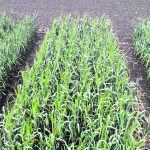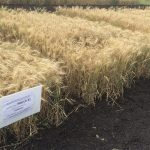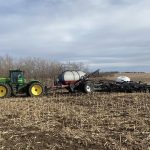A researcher says many sector players are involved in water management issues but they are often poorly connected
Many players are involved in water issues and water management, but they are often poorly connected. Irrigation authorities, municipal governments, Indigenous, provincial and federal authorities, industries and communities grapple with water issues. With Canada’s enormous supplies of fresh water, conflicts have not been as intense as in other parts of the world, for now.
Credit agency monitors grain shipments
In a commentary released May 17, DBRS Morningstar said it didn't believe the current fires would disrupt movement too much.

Ultra-early seeded wheat can survive
Are the risks associated with planting before temperatures can support a crop worth potential benefits?
When early seeding works it means early harvest and reduced odds of frost damage in the fall, hail and other risk factors. If ultra-early seeding works, it can also provide a grade benefit.
Dormant: fall-seeded winter crops
University of Alberta researcher Graham Collier explains, “In dormant seeding you want the ground cold as possible, so seed sits there without germinating until the following spring. You don’t want the crop to get snow right away because that might insulate the soil and maintain too much heat. If you get germination in the fall, that crop will die. You have a very narrow window of opportunity.

Three years ultra-early on-farm experience
“I think it’s definitely a risk. But I think the upside outweighs the downside, especially in our country out here at Consort (eastern Alberta),” said Farley.

Gene family stimulates longer wheat roots
Scientists at the University of California, Davis, have discovered that the right number of copies of a specific group of genes called OPRlll can stimulate longer wheat root growth, offering opportunities for farmers to grow healthier crops with greater yields, despite climate variables.

Caution advised when controlling flea beetles
Canola growers must know for sure their crops won’t be used as livestock feed before using lambda-cyhalothrin this year
Effective April 29, it is illegal to apply lambda-cyhalothrin products to canola and other crops that will be used as livestock feed in Canada.
New U of S researcher tackles forage
Beef industry research chair in integrated forage management addresses concerns raised by the beef, forage industries
The beef industry research chair position was created to help address concerns raised by the beef and forage industries.
There is much to know when vaccinating cattle for IBR
Producers must know when to vaccinate for IBR, whether to use killed or live vaccines, and whether to use parenteral (injectable) or intranasal vaccines.

No respite for wildfire-hit Alberta as conditions set to worsen
Of the western provinces Alberta has been the worst-hit, with about 91 wildfires burning, including 27 out of control, as of May 17. Wildfires have also proliferated in British Columbia, Saskatchewan and Manitoba.




